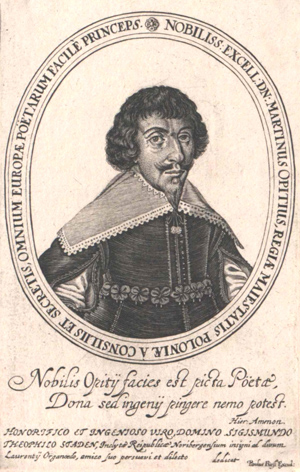
Martin Opitz, by Paul Fürst. Copperplate print, 15.2 by 9.4 cm. (Source of image: Wikimedia Commons)
As an offering in this week of the solstice, EMLO has released metadata for a selection of Martin Opitz’s correspondence. One of the founding fathers of German literature, Opitz is a poet with words for those in the throes of a dark and troubled northern midwinter. Could this be the moment to read his Trost-Gedichte in Widerwertigkeit deß Krieges [Poems of consolation at the resumption of war] of 1633, or, in the stillness of a long, dark night, listen to a reading of his poem Jetzund kömpt die Nacht herbei [Now the night comes], or to a recital of it set to music by Johann Nauwach (1595–1630) and sung by the incomparable Andreas Scholl.
Opitz was caught up in the horror of the Thirty Years’ War. Born in Bunzlau [now Bolesławiec, in Poland], he was one of the many scholars who traversed the face of Europe through these war-torn decades, studying in Frankfurt an der Oder, in Heidelberg, and in Leiden. From his letters, we are able to follow him to Breslau [Wrocław] in 1626; Prague in 1628; Breslau again in 1628–9; and Paris in 1630, where he met Grotius and members of the Dupuy circle. Opitz ended his days in Danzig [now Gdańsk], dying there of plague in 1639, nine years before the Peace of Westphalia brought to an end this episode of Europe’s misery. Opitz was a witness to troubled times.
